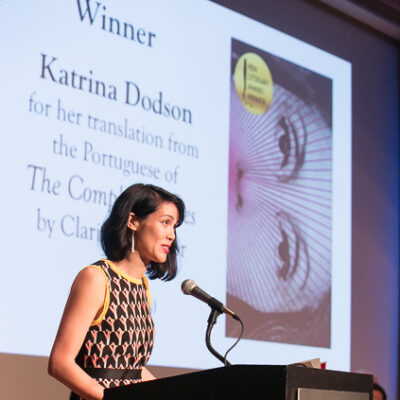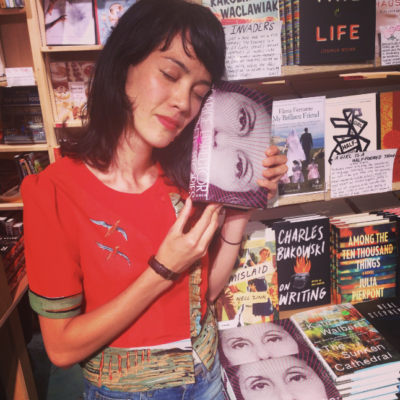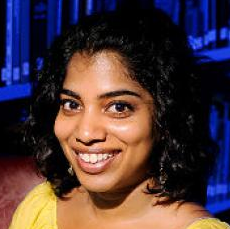
If someone had to inadvertently access my email inbox, I’m glad it was Katrina Dodson. During the week that I met Katrina in July 2016, I was teaching Elizabeth Bishop and writing about Clarice Lispector. Katrina, an Elizabeth Bishop scholar, is an acclaimed translator of Lispector. Last July we were both on a college campus in upstate New York for different reasons. One day I forgot to log out of my Gmail account on a public computer in a lab, and when Katrina came across the emails in my inbox with subject lines such as “crônicas draft” and “Self-Portrait in Green” (Marie NDiaye’s novel, which she knew and loved), she momentarily confused the account for her own. When she told me about it later, it seemed as though that accident was itself a serendipitous introduction between us. I was delighted by our shared affinities, and my admiration for her work included a particular warmth that I feel for brilliant women writers and thinkers.
Katrina is well known for her tremendous, prize-winning translation of The Complete Stories of Clarice Lispector. I have a million questions for her about that project; she is the kind of person I’d want to sit and talk with for hours. Because time was limited when we conducted this interview via email and Google doc, because she has spoken more fully about Lispector in other contexts, and because of the focus of Kitchen Table Translation, our exchange emphasized the intersections between translation, personal history, and cultural difference.
![]()
MHK: Can you talk about the relationship between your sense of identity and your work as a writer and translator from Brazilian Portuguese?

KD: I’ve always felt at odds with mainstream American culture and I think that has a lot to do with growing up in San Francisco and spending my formative years in majority non-white environments, both at home and at school, where a lot of my classmates had immigrant parents. My mother is from a rural village in north Vietnam and didn’t come to the U.S. until 1975—she met my father in Saigon, where he was stationed as a Foreign Service officer in the late 1960s. She was able to bring part of her family over here after the war, so as a child I was surrounded by relatives speaking Vietnamese even though we spoke mostly English at home. I identify as Asian American, and “hapa” more specifically, the term that came from Hawaii and that’s been adapted in California to identify people of part-Asian descent. I recently learned that in São Paulo, the word “mestiço” most commonly refers to mixed-race Asians, though people there usually assume I’m half Japanese, since Brazil has the largest population of Nisei Japanese.
This background has led me to seek out cultures and languages beyond the dominance of American English—maybe there’s something appealing to me about being an outsider by choice rather than by default. I’ve always wanted to write more about Vietnam and from a more overtly mixed-race perspective, but as a result of some fateful decisions and general momentum, I ended up going much further in my relationship to Brazil.
My Asian heritage gets obscured by my European name, Katrina Dodson, especially since my writing and translations have mainly been focused on Brazil. People often respond with curiosity when they meet me in person and can tell that I’m part Asian, or at the very least, not white. They’re usually pretty good at hiding their initial surprise, but then the question of my background eventually finds its way into the conversation. Sometimes people just assume that I’m Brazilian, and so it adds another level of surprise when I say I have no family connection to Brazil and that actually I’m half Vietnamese. I’ve thought about using my middle name, Kim, which my parents chose because it’s both a Vietnamese and an American name (in Vietnamese, it means “metal” and can become “gold,” “silver,” or other metals depending on what compound word it forms). But then people assume that I’m half Korean, so it just makes things more confusing. I’ve sometimes wondered if I should add my mother’s maiden name, to be Katrina Nguyen Dodson, to add that visibility to my name, and because I’m proud of my Vietnamese heritage. I wonder what effect that would have on how people view my work.
MHK: In your description of how you are read, there’s a sense that your name is curiously illegible to people when they first encounter you and requires some further translation.
I’m curious about how you began translating from Brazilian Portuguese? Have you ever translated or thought about translating from Vietnamese? Do you have projects that connect you to your Asian background?
KD: I came to Portuguese rather by accident—by deciding to move to Brazil with a boyfriend back in 2003. I’d studied Vietnamese in college and spent a semester at Vietnam National University in Hanoi, but it’s such a difficult language and was more daunting to try to master. When I first began my doctorate in Comparative Literature, I thought I’d be able to specialize in Brazilian literature in a comparative context, while also still being able to do some work with Vietnam. But the nature of academic scholarship meant I had to choose, and I chose Brazil, which has taken me down this path to translating Brazilian literature. It causes me some anguish to have such a close relationship to Brazilian culture, to often be mistaken for a Brazilian, and to feel less comfortable in Vietnamese contexts. I think in some ways, it’s easier for me to be integrated into Brazilian culture, in part because Brazil is diverse like the U.S., and mixed-race people are the majority there. Plus, I don’t take it personally when I make language mistakes or am pointed out as a gringa in Brazil. Vietnamese culture is much more exclusive, and mixed-race people are often not accepted as true Vietnamese. So it’s more fraught for me when I try to make inroads into the language and culture—I’m much more sensitive to “failing” when I speak Vietnamese or when I don’t know something. But I’m not done with Vietnam yet. I’d still like to go back and spend more time there and be able to really speak it with confidence. I’d like to write about my mother’s life one day. More recently, I’ve thought of translating some Vietnamese poetry with her. I got the idea from working with poet Brenda Hillman on new translations of the Brazilian poet Ana Cristina Cesar, which Hillman began translating with her mother, who is American but grew up in Brazil.
MHK: I think many writers and translators who are the children of immigrants would connect with the anxieties and sensitivities you describe. I certainly do. I enjoy translating from Spanish—a language to which I have no ancestral connection—much more than from Telugu, which is my native language, but not the primary language of my literacy. I have the same sense of failure—in my case a feeling of failing in my first language, failing my origins and culture. Because Telugu is so important to me, and the language already signals a kind of loss in my life, working with it is very fraught. Every attempt at translation from Telugu feels like a repetition of the difficult experience of immigration, whereas I feel quite free when working from Spanish.
I’d love to see what you might do with your mother working from Vietnamese. I have asked my mother to help me at times with translation, and early on I believed that relying on my family for help delegitimized me as a translator. Kitchen Table Translation arose in part from my re-evaluation of this notion. It’s been great to hear from other writers about how they work with family members. At our first Kitchen Table Translation event in New York in November 2016, Genya Turovskaya spoke about calling her mother from college to ask her about specific words in an Anna Akhmatova poem. And Zohra Saed talked about the back and forth process of working with her father to translate poems from Turkestani. It’s not only that I no longer think of such processes as illegitimate, but I also think that working in these ways can expand our understanding of what it means to translate, the way that translation crosses from the literary sphere into life and back.
Given that Brazil and Vietnam are two places that you have a connection to in different ways, have you found any resonances between your experiences of Brazilian Portuguese and Vietnamese? Or if there are not specific resonances, do you access particular experiences or feelings when you leave English (even if you return to it when you actually translate)?
KD: I’ve thought a lot about how the Brazil-Vietnam connection is somewhat random, and yet I’m always noticing similarities in my experiences with both places. Both are tropical countries, much poorer than the U.S., where a lot of life happens on the streets, in an informal economy. Both nations have a history of hardship and violence that somehow combines with an ability to maintain a certain lightheartedness through suffering and to enjoy just sitting on a stool and watching the world go by, something that Americans don’t seem to know how to do very well. I suppose that could be said of a lot of tropical countries.
One convergence that I find more striking is an echo between the languages. Having studied Vietnamese unexpectedly gave me an instinctive understanding of Portuguese spelling and pronunciation, elements that often perplex foreigners. Both Portuguese and Vietnamese have a lot of nasal sounds, and both languages strongly favor open syllables—you never end a word on a closed syllable in either language, even if you see a consonant. For example, “vão,” which can mean “they go” or “empty space” in Portuguese, sounds just like “vòng,” which means “round” or “circle” in Vietnamese. The phrase “đi vòng vòng,” means to go walking or cruising around, so I like to think of “vão/ vòng” as a place where the two languages I’m closest to intersect.
Imperialism makes for strange bedfellows, and it turns out that the romanized Vietnamese alphabet is derived from the Portuguese because the Portuguese missionaries who came to Vietnam from Macau and Goa in the early 1600s were the first to convert the language from Chinese script into Roman characters. The French Jesuit Alexandre de Rhodes is credited with romanizing Vietnamese, but his 1651 dictionary drew heavily on work done by the Portuguese. So even though there are virtually no Vietnamese in Brazil, there is this unexpected linguistic connection.
 In translating Clarice Lispector, I thought about her relationship to Portuguese as the child of immigrants who spoke with an accent and who brought other languages into the home—Yiddish and Hebrew. Lispector clearly dominates the Portuguese language in her writing yet makes these deliberate distortions that I feel must have started from having that window onto other languages that comes with being part of a diasporic community. Having to speak some Vietnamese with my relatives and listening to my mother talk on the phone in Vietnamese for hours definitely gave me a more imaginative relationship to English and to the givens of language in general than I otherwise would have had.
In translating Clarice Lispector, I thought about her relationship to Portuguese as the child of immigrants who spoke with an accent and who brought other languages into the home—Yiddish and Hebrew. Lispector clearly dominates the Portuguese language in her writing yet makes these deliberate distortions that I feel must have started from having that window onto other languages that comes with being part of a diasporic community. Having to speak some Vietnamese with my relatives and listening to my mother talk on the phone in Vietnamese for hours definitely gave me a more imaginative relationship to English and to the givens of language in general than I otherwise would have had.
MHK: I think that’s something that’s not acknowledged widely enough: how access to multiple languages can enhance your imaginative capacities in your primary language.
Lastly, on a slightly different note, what are some works that you love that have come to you through translation?
KD: I can say with conviction that Ferrante Fever is forever for me, and I’ll say it five times fast. Elena Ferrante is responsible for making me want to learn Italian next, but I’m also a huge fan of her translator Ann Goldstein, who is now a friend. I discovered the creepy magic of Polish writer Witold Gombrowicz through Danuta Borchardt’s intoxicating translations, especially Cosmos and Ferdyderke. The Senegalese-French writer Marie NDiaye is a more recent revelation. I was completely absorbed by her Self-Portrait in Green. I sometimes read books in French, when I’m not feeling lazy, but her translator Jordan Stump does a beautiful job, and it’s just a lot easier to get your hands on the translations in the U.S. Yoko Tawada is another writer I’m glad to be able to access through translation. Her The Bridegroom Was a Dog was translated from Japanese, and I’m about to start Memoirs of a Polar Bear, which she wrote in German and is translated by the highly respected Susan Bernofsky.
Cover Image: Cropped cover of The Complete Stories by Clarice Lispector
, translated by Katrina Dodson. Buy the book.

Madhu Kaza was born in Andhra Pradesh, India and grew up in Detroit, Michigan. She is currently an educator, writer and artist based in New York. Much of her work is informed by her astonishment at everyday life.






